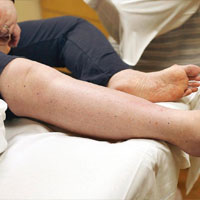 Understanding Lymphedema
Understanding LymphedemaAt Southlake Vein Care, we work hard to help our patients understand and manage lymphedema. This condition can significantly impact your quality of life, which is why we work to educate and spread awareness.
Lymphedema is a chronic condition which involves swelling in one or more parts of the body. It presents most commonly in the arms or legs. It occurs when the lymphatic system, which helps maintain fluid balance and immune function, is not able to effectively drain the lymphatic fluid out of the limbs. This can happen when the lymphatic system is abnormal, gets damaged, or when the body is creating more lymphatic fluid than it should. This can lead to a buildup of lymphatic fluid in the tissues, causing persistent swelling and other associated symptoms.
The signs and symptoms of lymphedema can vary but generally include:
While it is not typically life-threatening, it can lead to severe complications if left untreated. These complications include infections (such as cellulitis or abscesses), skin changes, and in rare cases, lymphangiosarcoma, a form of cancer. Proper management and treatment are crucial to prevent these serious outcomes and maintain a good quality of life.
We use the following methods to diagnose lymphedema:
Lymphedema can be classified into two main types: primary and secondary.
Several factors can increase the risk of developing lymphedema, including:
Lymphedema is best treated with a combination of therapies, including:
Lymphedema is a chronic condition that typically does not resolve on its own. Without treatment, it can progress and lead to further complications, such as increased swelling, infections, and skin changes. As a result, early intervention and consistent management are crucial to control symptoms and prevent worsening of the condition.
Currently, there is no cure for late stages of the condition. However, with appropriate treatment and management, you can effectively control symptoms, keep the involved tissue healthy, and lead a healthy and active life. Early diagnosis and intervention are key to preventing the progression of the condition and improving the overall quality of life.
Our dedicated team of specialists can help you manage your lymphedema and improve your well-being. Call us at 972-378-5347 or request an appointment online.
In most cases, health insurance and Medicare will cover treatment of vein procedures, assuming the patient meets the criteria for treatment. Out of pocket expense depends on many factors, such as deductible met and the specifics of the individual plan. Our staff will work with you to understand the benefits and coverage provided by your insurance as well as any requirements that will need to be met.






















